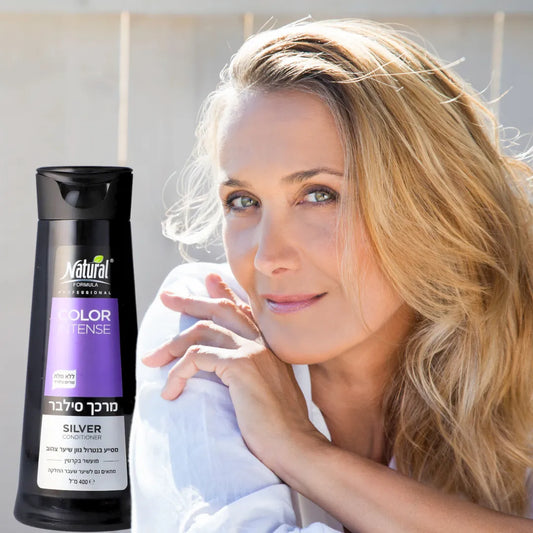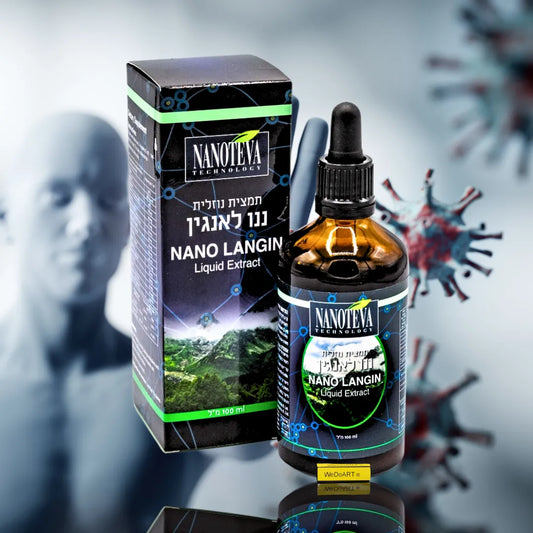JUST ARRIVED
Every day, new products are being added to the store.
-
NANOTEVA - NANO FIXOLIN liquid extract 100 ml
Vendor:NANOTEVARegular price $69.90 USDRegular priceUnit price / per -
ULTRASOL MAX Protective lotion SPF50+ 200 ml
Vendor:Dr. FischerRegular price $48.90 USDRegular priceUnit price / per -

 14% Off-Limited Time Offer
14% Off-Limited Time OfferELITE No.09 Decaffeinated - 30 Espresso Capsules for Nespresso machine
Vendor:ELITERegular price $49.90 USDRegular priceUnit price / per$58.00 USDSale price $49.90 USDSale -
Careline OIL FREE Cleansing Toner for Oily & Problematic Skin 400 ml
Vendor:CarelineRegular price $45.90 USDRegular priceUnit price / per -
Dan Pharm - Natural Citronella oil 10 ml
Vendor:Dan PharmRegular price $40.90 USDRegular priceUnit price / per -
Natural Formula - Silver conditioner helps neutralize yellow hair tone 400 ml
Vendor:NATURAL FORMULARegular price $35.90 USDRegular priceUnit price / per$0.00 USDSale price $35.90 USD -
LALINE- Mineral body lotion 200 ml
Vendor:LALINERegular price $44.90 USDRegular priceUnit price / per -
LALINE- Mineral Rich Body Cream 250 ml
Vendor:LALINERegular price $66.90 USDRegular priceUnit price / per -
LALINE- Mineral Gold mask 50 ml
Vendor:LALINERegular price $46.90 USDRegular priceUnit price / per -
NANOTEVA - NANO CURCUMIN liquid extract 100 ml
Vendor:NANOTEVARegular price $65.90 USDRegular priceUnit price / per -
NANOTEVA - NANO BOSWELLIA liquid extract 100 ml
Vendor:NANOTEVARegular price $62.90 USDRegular priceUnit price / per -
NANOTEVA - NANO GINGER liquid extract 100 ml
Vendor:NANOTEVARegular price $62.90 USDRegular priceUnit price / per -
NANOTEVA - NANO FEMIX liquid extract 100 ml
Vendor:NANOTEVARegular price $65.90 USDRegular priceUnit price / per -
NANOTEVA - NANO LANGIN 100 ml
Vendor:NANOTEVARegular price $65.90 USDRegular priceUnit price / per -
NOVIKS - Moss cream (Syrian oregano) 30 ml
Vendor:NOVIKSRegular price $55.90 USDRegular priceUnit price / per -
NOVIKS - Moss spray (Syrian oregano) for the mouth and throat 30 ml
Vendor:NOVIKSRegular price $44.90 USDRegular priceUnit price / per -
LALINE- Mineral Mud mask 50 ml
Vendor:LALINERegular price $44.90 USDRegular priceUnit price / per -
LALINE Vanilla Pink Pepper Body and Hand Mousse Soap 300 ml
Vendor:LALINERegular price $38.90 USDRegular priceUnit price / per -
Renew-OR Night cream for reducing initial wrinkles 50 ml
Vendor:Doctor OrRegular price $79.90 USDRegular priceUnit price / per$0.00 USDSale price $79.90 USD





For a limited time
Enjoy free shipping on all orders and a 5% discount for orders of $80 or more.
Let customers speak for us
from 76 reviews
5 étoiles
Les cheveux sont hypra doux après la pose d’une petite noisette de produit ! Bravo

Argania Castor Oil Shampoo 450ml

Thank you very much. Everything arrived on time. The item matches the order.

אני משתמשת בו על שער נקי ולחות, אחרי זה מוסיפה קרם לשער שיש לי בבית ומקבלת תלתלים מעולים. פעם הבאה אקנה קרם "curl power" .
ממליצה לנסות❤️

We use it because we are concerned that other deodorants may be cancer causing,
It is also particularly effective in keeping fresh all day. It is worth the price.

Just checking in to see if you’ve tracked my package. I have not received it and yet your email stated that it was delivered to me. Can you please verify if this package was delivered. I’m not seeing it delivered yet. Many thanks! Karin

I'm absolutely delighted with this lotion! It leaves my hands feeling incredibly silky and smooth. This winter, it's been a game-changer for my eczema - providing much-needed relief. Although it has a subtle scent, which I usually avoid, I've had no issues with this one. In fact, I was so impressed with the first tube that I promptly ordered more.

Very good

Fast and high C/P

My Israeli girlfriend couldn’t find her perfume anywhere we are so glad you guys shipped to California! And quick!

Thank you so much it arrived and it works wonderful

I bring this product into Australia because it's the best thing I've found on the market world wide.

loved the service and the product! i will order again!

thank you for delivery.

SeboCalm daily Routine Rich Cream- nourishing the skin & preventing dryness 50ml


































































































































































